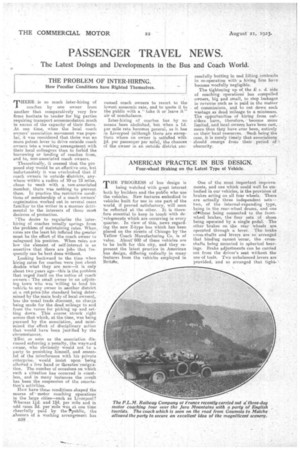PASSENGER TRAVEL NEWS.
Page 22

If you've noticed an error in this article please click here to report it so we can fix it.
The Latest Doings and Developments in the Bus and Coach World.
THE PROBLEM OF INTER-HIRING.
How Peculiar Conditions have Righted Themselves.
THERE:is so much inter-hiting of coaches by one owner from another that comparatively very few firms hesitate to tender for big parties requiring transport accommodation much in excess of the capacity of their fleets. At one time, when the local coach owners' association movement was popular; it was considered that the're was no more potent lever to drive outside coach owners into a working arrangetnent with their loeal colleagues than to forbid the borrowing or lendiog of coaches from, and to, non-associated coach owners.
Theoretically, if, seemed that the pro posed step would be an effective one, but unfortunately it was overlooked that if coach owners in outside elistricts, anywhere within a radius of 10 or 12 miles, chose to work with a non-associated member, there was nothing to prevent them. In practice the restrictive conditions of membership of a coach owners' organization worked out in several cases familiar to the writer in a manner detrimental to the interests of those most desirous of protection.
:`The desire to regularize the interhiring of coaches usually springs from the problem of maintaining rates. When, rates are the least bit inflated the greater must be the effort of the coach owner to safeguard his position. When rates are low the element of self-interest is so assertive that there are jobs that frequently can be best done without.
Looking backward to the time when hiring, rates for coaches were just about double What they are now—it is only about two years ago—this is the problem that urged itself on the notice of coach owners : The small Owner in an adjoining town who was 'willing to lend his vehicle to any owner in another district at a cut price (the standard being determined by the main body of local owners), less the usual trade discount, no charge being made for the dead mileage to and from the venue for picking up and setting down. This .course struck right across that which, at the time, was being pursued by the association, and minimized the effect of disciplinary action that would have been justified by the circumstances.
3But so soon as the association discussed enforcing a penalty, the wayward owner, who obvieuslv would not be a party to punishing himself, and resentful of the interference with his private enterprise, would insist upon being ailoiked a free hand or threaten-reSigaation. The number of occasions on which such a situation has occurred is countless, and in many instances the lesiilt has been the suspension of the easoeiation's activities.
how have these conditions.shaped the course of motor coaching operations in the large cities—such as Liverpool? 'Whereas 110. and 11d. per mile and in odd cases 2d. per male was at one time cheerfully paid by the lipublic, the _absence of a working arrangement has B38 caused coach owners to resort to the lowest economic rate, and to quote it to the public with a "take it or leave it" air of nonchalance.
Inter-hiring of coaches has by no means, been abolished, but when a ld. per mile rate becomes 'general, as it boa in Liverpool (although there are exceptions where an owner is satisfied with per passenger per mile), the chances Of the owner in an outside'elietriet suc
cessfully butting in and lifting contracts in co-operation with a hiring firm have become woefully negligible.
The tightening up of the £ s. d. side of coaching operations4 has compelled owners, big and small, to stop leakages in revenue snub as is paid in the matter of commissions, and to cut down such WaStage as dead 'mileage to a minimum. The opportunities of hiring from outsiders have, therefore, become More limited, and local owners have been cast, more than they have ever been, entirely en their local resources. Such being the case, it is surely timely that associations should emerge from their • period of obscurity.




























